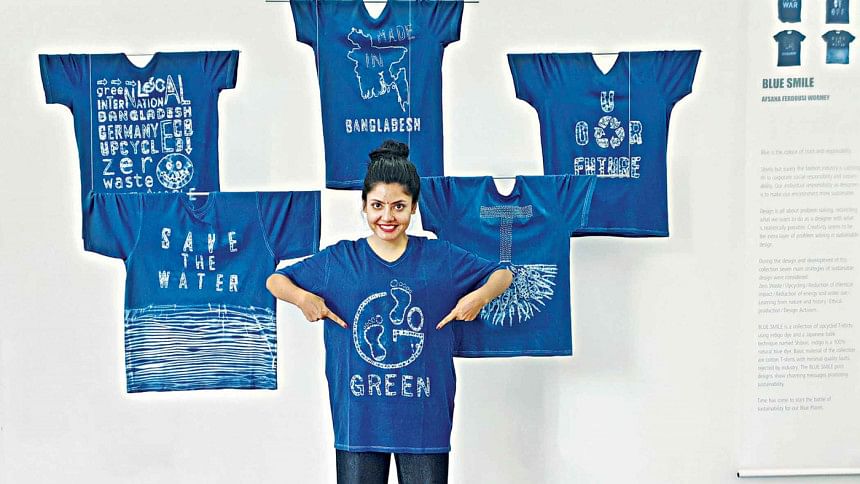Sustainable Fashion Activism

To dive deeper into the subject-matter, we needed to speak to an expert who had experience in both the differing perspectives, fast fashion and slow fashion to be precise. Appointed as the Senior Product Developer at a popular U.K. brand – Next, and also the owner of a local sustainable brand AF, Afsana Ferdousi seemed to be the right person to give us plausible answers.
"I have tried to maintain sustainable fashion rules and regulations all throughout my production process," began Ferdousi. She continued to say, "A major portion of the onus lies on us; if we - as designers, cannot show the way towards sustainability, then I don't know who will! Designers introduce consumers to new trends, and motivate their buying choices. It's a huge responsibility and my brand AF works from this perspective", claimed the sustainable fashion activist.
She continued to add, "Our collections are story based, every line that we produce speaks about an important information that will encourage us to be more responsible towards the world we live in – whether it is racism, human rights, animal rights or even being eco-friendly."
Based on our conversations, we learned that the brand AF was largely known for its association with recycling and upcycling where waste fabric and yarn from larger garments factories were sourced and re-used to make new collections. "We even use defective T-shirts from these factories, the discarded clothes and re-work on them using natural dyes like indigo and the shibori technique to make new and attractive high-couture tops," declared the designer.
"Since I have directly worked with fast fashion manufacturing units in the past, the concept of being eco-friendly became clearer. I could have imported yarn from abroad, or made brand new t-shirts from scratch, wasting thousands of litres of water, oil, energy and money to make a similar product, which wouldn't look any different or even better. At least this way, my conscience stays clear," admits Ferdousi.
To encourage clientele to get familiar with the concept of recycling, AF introduced bespoke designs with second hand fabric, where customers could bring their old clothes including saris and AF helps to transform them into contemporary styles like the jumpsuit or kaftan.
"70 percent of our clothes are made out of upcycling – using natural dyes, whilst the rest 30 percent are recycled waste from garments factories that hold certificates for ETP (Effluent Treatment Plants), and maintain GOTS (Global Organic Textile Standard)," revealed Ferdousi.
"Based on my experience, I have learnt that the fast fashion industry is not completely reckless as before because there are various measures in places and global standards set in motion, to make them as eco-friendly as it is possible for the moment. The work is continuous, giving us hope to a promising future," the designer informed.
From Ferdousi we also learnt that ETP helps in cleaning the chemical laden waste water of factories by making it reusable for other uses like agriculture. And GOTS, is a certification given to factories that work with BCI (Better Cotton Initiative) cotton and organic cotton. Where, Better Cotton Initiative (BCI) is a global not-for-profit organisation that partners with millions of cotton farmers across the globe, providing training on sustainable farming practices.

 For all latest news, follow The Daily Star's Google News channel.
For all latest news, follow The Daily Star's Google News channel. 



Comments